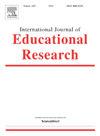中国幼儿教育教师人际情绪调节及其特征:多个案研究
IF 2.5
3区 教育学
Q1 EDUCATION & EDUCATIONAL RESEARCH
引用次数: 0
摘要
幼儿教育(ECE)教师经常面临多样化和具有挑战性的人际情感调节(IER),这对他们自己的福祉和孩子的学习和发展构成了重大挑战。然而,现有的研究对幼儿教育教师的情感感受关注较少。为了解决研究空白,我们进行了定性研究设计,使用访谈和关键事件表格收集了中国广州28名ECE教师的IER策略。本研究扩展了一个新的情感干预框架,将幼儿教育教师的情感干预策略分为两个维度:(a)目标(即内在情感干预、外在情感干预和人际情感协同调节)和(b)情感干预的参与方式(即情绪聚焦调节、情绪→认知聚焦调节、情绪→行为聚焦调节和情绪→认知→行为聚焦调节)。本研究还分析了中国情境下幼儿教育教师情感教育的特点。不同目标个体的IER策略不同,频繁出现在“关西”1中,且随着资历的不同而不同。本研究探讨了中国背景下幼儿教育教师如何通过协调人际关系来调节自己或他人的情绪,并为幼儿教育教师教育提供启示。本文章由计算机程序翻译,如有差异,请以英文原文为准。
Exploring interpersonal emotion regulation and its characteristics among Chinese early childhood education teachers: A multiple case study
Early childhood education (ECE) teachers frequently confront diverse and challenging interpersonal emotion regulations (IER) that present significant challenges to their own well-being and the children's learning and development. However, existing research has paid less attention to the IER of ECE teachers. To address the research gap, we conducted a qualitative research design to collect the IER strategies of 28 ECE teachers in Guangzhou, China, using interviews and critical incident forms. This study extended a new IER framework to classify the IER strategies of ECE teachers into two dimensions: (a) the target (i.e., intrinsic IER, extrinsic IER, and interpersonal emotion co-regulation) and (b) ways of involvement of IER (i.e., emotion-focused regulation, emotion→cognition-focused regulation, emotion→behavior-focused regulation and emotion→cognition→behavior-focused regulation). The study also analyzed the characteristics of ECE teachers' IER in the Chinese context. The IER strategies differ based on target individuals, frequently occur in close “guan xi”1, and differ with seniority. This study explored how ECE teachers regulate their emotions or others’ emotions by harmonizing their interpersonal relationships in the Chinese context and provides implications for ECE teacher education programs.
求助全文
通过发布文献求助,成功后即可免费获取论文全文。
去求助
来源期刊

International Journal of Educational Research
EDUCATION & EDUCATIONAL RESEARCH-
CiteScore
6.20
自引率
3.10%
发文量
141
审稿时长
21 days
期刊介绍:
The International Journal of Educational Research publishes regular papers and special issues on specific topics of interest to international audiences of educational researchers. Examples of recent Special Issues published in the journal illustrate the breadth of topics that have be included in the journal: Students Perspectives on Learning Environments, Social, Motivational and Emotional Aspects of Learning Disabilities, Epistemological Beliefs and Domain, Analyzing Mathematics Classroom Cultures and Practices, and Music Education: A site for collaborative creativity.
 求助内容:
求助内容: 应助结果提醒方式:
应助结果提醒方式:


